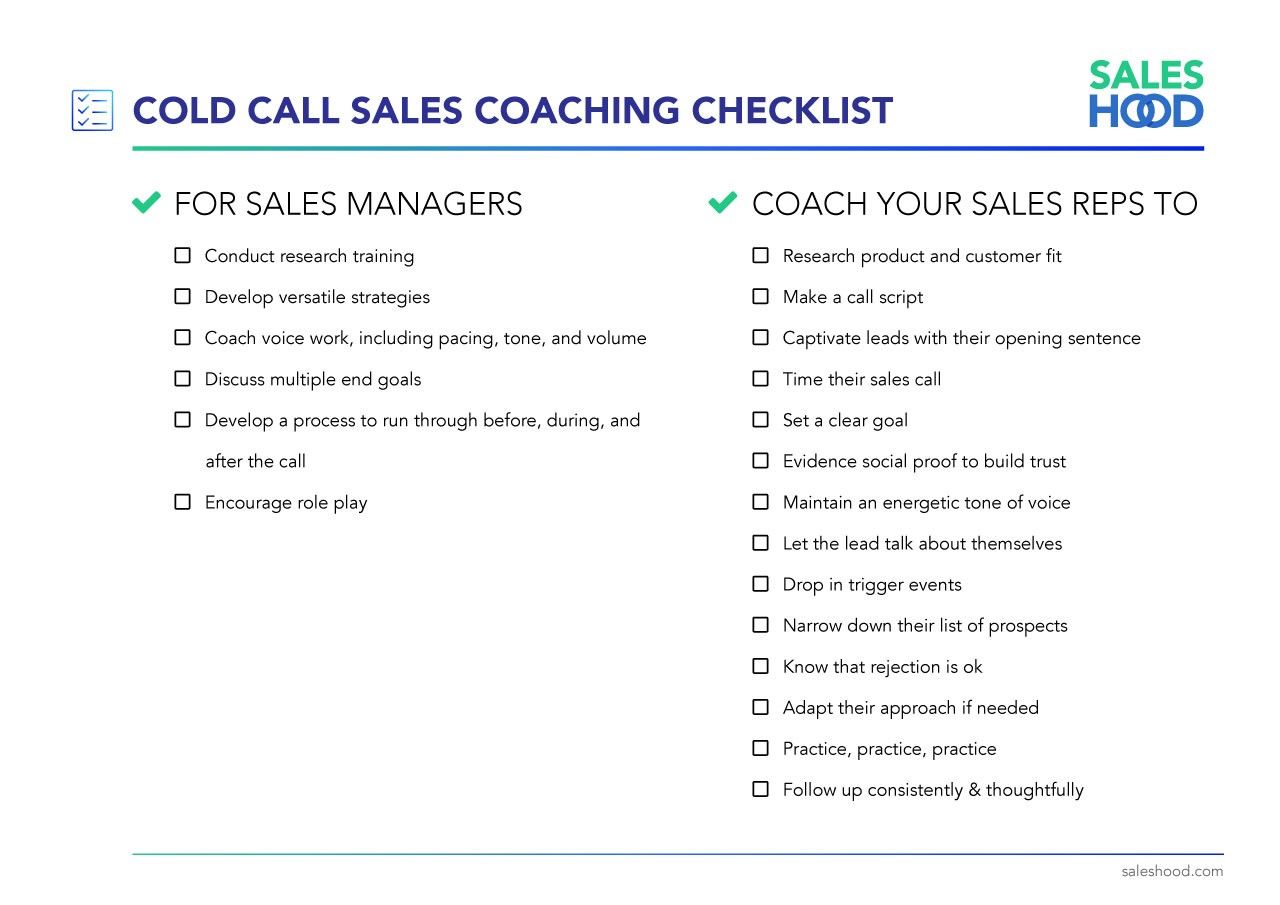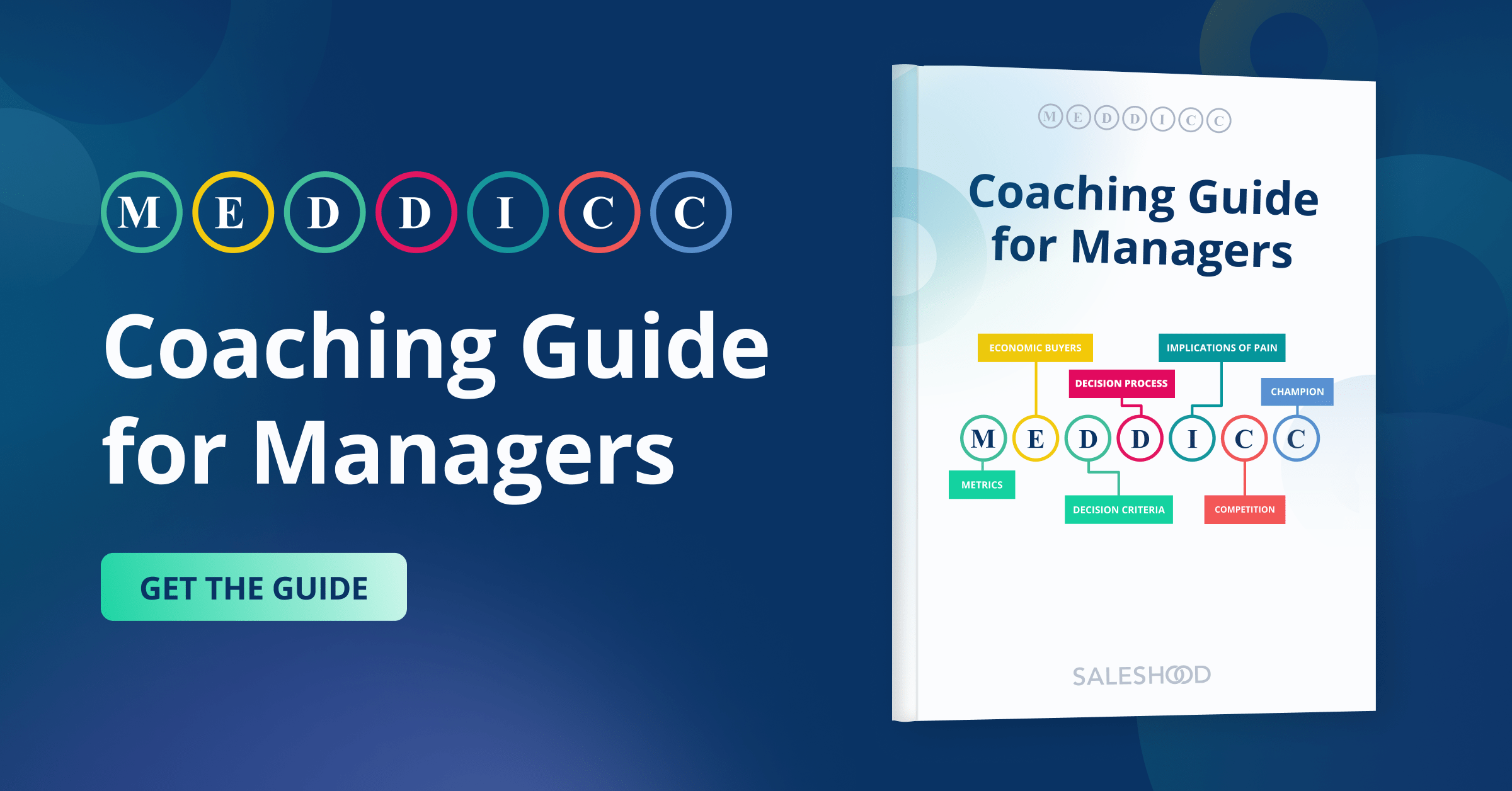Cold calling can be awkward and intimidating at first, but there are some useful cold calling sales tips you can share with your team to multiply their cold calling success, engagement, and sales in no time.
Most people hang up right away when they hear the dreaded “hey do you have a couple minutes to talk about..”, which can be discouraging for a new sales professional. But if they have the right words and a solid grasp of your sales strategy, then they will captivate customers easily, gain confidence, and improve your overall sales prospects.
There is no perfect formula out there, but here some of the best cold calling tips to help your improve sales teams’ performance.
What Makes an Effective Cold Call?
These days only about 2% of cold calls actually lead to a meeting with the customer, so as a sales coach you want to make sure that your team is part of 2% and that your success rate is higher. Every detail can influence the effectiveness of a cold call. The slightest change in a person’s mood can greatly affect the likelihood of the customer even picking up the phone. Despite the stigma of telemarketing, an effective sales call can, of course, increase sales.
As you’re working with your team to develop a strategy, here are some sequential cold calling tips to consider.
Research
This is a crucial step that should be required for every sales call. Everyone is more willing to listen to someone that knows who they are talking to. By doing research you can learn more about the prospect and also appear more knowledgeable. You are able to figure out what they may want or need ahead of time, and they may be more likely to open up to you. This is an important step to make the cold call a warm call that is more personal. Research lets you make calls that are useful and captivating to the prospect.
Outlining
- Writing an outline or cold call script, or even finding an example of one can help you stay on track during your call. These do not have to be super detailed since you only want to use this as a reference.
- The main point of the outline is not to read off word for word, but instead only as a guide. Writing down a rough outline can help you convey your message more concisely.
Captivating Opening Sentence
- The opening sentence is arguably the most important factor of a successful cold call. You only have about 15 seconds once your prospects pick up the phone to make an impression and convince them to talk to you. A subpar opening sentence is one of the main reasons why many prospects hang up.
- An example of a successful opening sentence would be to compliment them with something you found during your research. Another great option is to acknowledge that you may be interrupting their day. This will make people more likely to want to hear you out.
Timing
- According to Yesware’s analysis of over 25,000 calls, the best time to place that phone call is Tuesdays and Thursdays between 3:00-5:00 PM. They found that between these times, cold callers were able to hold calls that lasted over 5 minutes.
- Although there is an optimal time for longer calls, the most important time to keep in mind is the prospect’s. A great tool to help you determine the best time is to keep track of the data. There are many call tracking tools to help you find the best calling time, or you can even track your data on a simple excel sheet. Like most things in life, timing is crucial.
Clear Goals
- Having a clear goal in mind when making your cold calls help you get to the point quickly. This way you are not wasting your time or the prospect’s time. Not having a goal can decrease motivation, focus and direction. There can be a number of different goals when making a cold call. It does not always have to be to land a sale.
- A goal can be anywhere from increasing engagement time to committing to a meeting, or getting a call back. Setting goals can help you start taking steps towards achieving it.
Social Proof
People are more likely to listen to someone that is an expert or has gone through the same thing. Social proof is a major factor in increasing sales because we are trying to appeal to someone that does not know us at all. Throwing in something or someone that they trust or are familiar with can greatly influence their willingness to listen. For example, if someone were to recommend a product to you that a celebrity uses, you are probably more likely to try it out.
Tone of Voice
- This may sound like a given, but since the prospect only gets to hear the sound of your voice, your tone of voice and speech pattern can influence them into trusting you. According to communication research, 38% of communication comes from only the tone of your voice. It can convey fear, confidence, boredom and much more.
- A great way to practice this is with other people. They can give you feedback on how you sound. Another strategy is called mirroring. Have you noticed that when you hang out with your friends, you often pick up on phrases or mannerisms they use?
- Mirroring your prospect’s tone of voice and certain words or phrases they use can make it feel as if they are talking to someone they know.
Them, Not You
- According to psychologists, peoples’ favorite topic to talk about is themselves. When people talk about themselves, it activates the same region in the brain that fires up when you eat or do something you like.
- As a salesperson, you can use this to help gain their attention. You can let them talk about themselves, and take some points to help keep them interested. When cold calling, you need to be sure not to do all the talking, but make sure the prospect gets a chance as well. Ask cold calling questions, which are open ended questions to help your prospect be more engaged in the conversation.
Trigger Events
- People are more likely to be interested in something that you are selling if they are lacking that certain something. Trigger events are opportune moments where you believe your prospect is most likely to show interest. For example if you try to motivate your kid with candy, they probably will not listen if they just had candy. This is the same for your prospects.
- If you are offering something that they do not feel they need, they probably won’t bite. A good way to keep up with trigger events, is to check up on public information. It is a good idea to constantly check things like company expansions, increased funding, behavioral indicators, large contracts or announcements and mergers.
- Mentioning it during your conversation, or saying congratulations, can make it seem like you really put in a lot of effort in talking to them. Some great resources to use include Mention who stays updated on public insights, public forums or even Google Alerts.
Targeted List
Having a targeted list can save the prospect’s time as well as your own. Even though rejection is still going to happen, it may happen a lot less if you narrow down your list to prospects you believe will be interested. This way you are not calling people that are simply uninterested in what you are selling. Cold calling can take up a lot of time, so do not waste your time trying to reach people that will not benefit from your offer. It will definitely take some time to come up with a targeted list, but it will save you time in the long run.
Practice
Practice, practice, practice. Just like you practiced your play lines in front of the mirror before your fifth grade play, cold calls take a lot of rehearsing. That first cold call will be especially daunting, and since cold calling is a two way conversation, we definitely recommend practicing with someone. Even though it can be great to practice your lines and get comfortable with a general script, practicing with a real person can help you get more comfortable with talking on the fly. Your partner may have a similar response to one of your prospects and when you hear it, you will know exactly how to answer.
Coping with Rejection
Even getting rejected by prospects is considered practice. You can learn from where the call went wrong, and try to change that with the next try.
Simply put, there is no way to close 100% of their prospects. Cold callers need to keep in mind that rejection is a part of cold selling and cold calling. It is important not to get discouraged, even if you do get rejection after rejection. If this is happening, it may be helpful to talk to your manager for helpful cold calling tips. It is also helpful to revise your cold script or approach to cold call. We realize that cold calling can be disheartening at times, but you have many resources available that can help you improve.
Adapting
It is a fact that people are really different and times are constantly changing. Even though you may have written out a general cold call script, it is important to constantly update it according to the calls you make. You can keep track of where you slip up and adapt your cold call script. It is also important to be able to adapt to the person’s tone of voice or mood. There is no perfect way to cold call, so making small changes here and there can help you find the best method for you.
How to Coach Your Team to Success
Although the cold callers are the one talking to the prospects, sales managers have the most important role. You train and provide your team with the tools they need to increase enterprise. Just giving your caller a call script is not enough. Provide them with effective sales tips for cold calls. They need a coach, constantly checking up on them to improve their skills. Here are a couple cold calling tips to train your callers to produce effective cold calls.
Research Training
Research training is so important, since cold calls require a certain level of research. It also depends on what is being sold and the goal that you want them to set. Training in this area is important because if your caller does the wrong research, or not enough of it, they are already set up for failure. It may seem like an easy step to skip and just let them try it out and learn, but research training can go a long way in increasing engagement. A great way to go about this is:
- Give them a general idea of the time they should spend on researching. This helps them not waste too much time.
- Give them resources on where to find the information. This can be a company website, or forum.
- Explain how their research can affect their approach. After they have gathered the research, it is important to go over how they can implement it into the call.
Versatile Strategy
There is no cold cut formula to cold calling, and trying to create a universal approach can really bring down your teams’ sales. One strategy that works for one cold caller may not work for another. Giving everyone a limited call script or having a too straightforward approach is a common manager failure. Working with your callers one on one and practicing constantly with new techniques and approaches can keep cold calling feeling fresh. It can be extremely discouraging for your callers to keep getting rejected, so trying out different techniques with our callers can help to keep them motivated. Do not just hand them a call script and try to get them to reach a certain number of calls in a day. As a manager it is important to find that balance between quality and quantity
Voice Work
Just like your callers need to practice their voice work, it is the coach’s job to work on it with them. Without things like facial expressions or body language, it can be limiting for your team. Be sure to work with your sellers on changing up their tone of voice. Even if they may not know it, even a small inflection in their voice can greatly affect the customers’ decision. Your voice can make or break a sale when it comes to cold calling. Here are a couple things to work on with your callers to help communicate an assertive but empathetic tone.
- Pacing – A good tip to give your callers it to talk at a slightly faster pace than the prospect. This can help you sound well-informed and knowledgeable without rambling. Contrary to what most people think, speaking slowly actually does not work well for cold calls. A great way to practice this is to role-play conversations at different speeds. Since everyone talks at a different pace, it is important to be able to adapt to the prospect.
- Tone – This can be difficult for many people. Even if they may not think they sound this way, they can to other people. Some people naturally sound monotone, and if they try to compensate for that they may sound too fake. For those that struggle with this, make sure to practice extra with them so they can get used to it. The main goal is to sound interested and interesting to the person.
- Volume – This can be a tricky one to master. Depending on the person (and connection) your cold callers may need to make adjustments to the tone of their voice. Being too loud can make them seem pushy and drive away customers. Being too quiet can make them seem uninteresting and not confident. A good rule of thumb is to speak slightly louder than a normal conversation. This helps them seem secure and confident without being overly aggressive.
Multiple End Goals
Different goals can involve different strategies and have different eng goals. Consistently changing the approach can help your team improve their performance. Depending on the call, there are a variety of different objectives to keep in mind. Some attainable goals to work towards include:
- Taking down another form of communication to send out additional information (this can be an email, or mailing address)
- Noting if the prospect might be interested in your products or services sometime in the future (if not now).
- Getting the prospect to sign up for a free demo of your product. This shows their interest, and a free trial can help them determine if they need your services or products.
- Getting the prospect to subscribe to our content resources to keep up to date.
- Obtaining a sale of your product or service.
Process
As a coach you can come up with a loose guide for your team to follow. Even though you introduced that cold calling strategies are supposed to be flexible, having an overall process can be helpful to direct your team. This process can change and improve with input from your own team. The guidelines can be broken up into different steps of the call: before, during, and after the call. As a sales manager, it is important to make sure your team is prepared for anything.
- Before the call: Some things to discuss with your cold callers are the overall outcome of the call. You can facilitate the discussion based on the outcome you guys are trying to reach, especially if you have set sales activity metrics. Once an overall goal is set, then you can discuss the routine they can map out to get there. It is important to also use the research they gathered to come up with actionable steps.
- During the call: During the cold call it is important to make sure your team speaks clearly and from a position of power and authority. A good coach will constantly practice with their team to deliver the best possible spiel. It is important to practice as much as possible to help your callers think quickly. You should set up different scenarios and let your team practice problem solving. They should always be able to put themselves in a solution to the prospect’s problem.
- After the call: Be sure to train your cold callers to understand that the after part of the call is actually important in securing sales. A follow-up call or email can help you build a relationship with the customer and gain their trust.
Role-play
We cannot stress the importance of this. Even though planning is an integral part of a successful cold call, role-playing can help your callers come up with answers on the fly. You can prepare them as much as you want, but unless your callers get actual practice, they will not be as prepared as they can be. A helpful coach will provide a wide variety of different difficult scenarios for your callers to navigate through. Even though it could be awkward at first, your callers will feel more confident and prepared in their calls.
- Cold Calling Confidence – Cold calling can be really difficult because rejection is a big part of cold calling. Especially with newer callers, be sure to have a conversation with them and continually provide them with support. Addressing the problem head on can help them prepare for rejection. We found that a good way to keep the energy positive is to make a game from it. Tracking rejections and providing prizes can help your callers deal with the constant rejection. A coach that understands their players is better equipped to lead their team to success.
- Personality – Bringing out the personality of your sales rep can help them improve their sales. It can be hard to stop sounding like a robot and more like a friend, especially with the high volume of calls that cold calling requires. According to psychology studies, people want to feel understood and acknowledged. You can help your sales rep team integrate their personality into their calls. A great way to do this is to have an open and supportive environment. Take the time to get to really know your callers and create an open space for them.
- Have a Checklist – Provide your callers with a checklist of all the things they need to remember or look for. Cold calling is truly an intricate process and can take some time to learn. Provide your team with a list so they always feel prepared and organized.
Example Cold Calling Coaching Checklist to Boost Success Rate
- Research
- Opening sentence
- Make a call script
- Timing
- Tone
- Set Goal
- Social proof
- Follow-Up
- Adapt your approach
- Be personable
- Rejection is ok
- Ask for help
- Practice, practice, practice

How to Make a Cold Call Sales Pitch
To make an effective cold call integrate your research into your calling approach. Be sure to catch your prospect at the right time and capture their attention within the first ten seconds. Keep your goal in mind, while still maintaining a meaningful and personable conversation. Remember to be assertive, but not aggressive. After your call, remember to follow-up with them and also take notes on how the call went. If this call didn’t work, do not worry. You have plenty more. Adapt your strategy and you will make more effective cold calls.
Does Cold Calling Still Work? Yes it does
Why Cold Calling Still Works
Many people think that cold calls and cold calling techniques hamper the sales process these days; however, most of the time it is not effective because it is done wrong. With all the other ways to get buyers these days, cold-calling is not at the top of people’s list, but it actually is a really effective way to gain enterprise. The main reason why cold-calling works is that many B2B buyers would prefer to be contacted by phone. Through the phone, you are able to make a connection and possibly grow that relationship. Even though not everyone can be reached through sales calls, reaching out to the right people is truly effective.
As a manager be sure to properly train your sales team and set them up for success. It can be tempting to just throw sales reps into the field cold for that initial sales conversation, but this will not yield a strong success rate in the long run. Thoroughly train your sales teams to complete all the necessary steps to make an effective call. Not only is training important, but coaching them through the entire process is essential. Cold calling can seem like a really difficult process that may not be worth your sales reps time. But done right, cold calls can be an extremely effective tool in growing your enterprise.



